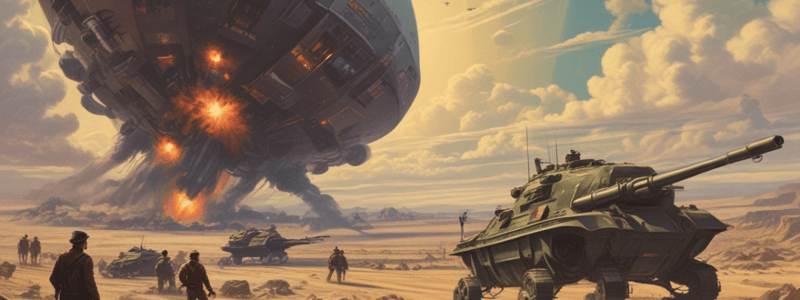Podcast
Questions and Answers
What was the main trigger that led to the outbreak of WW1?
What was the main trigger that led to the outbreak of WW1?
- The competition for colonies and resources
- The rise of nationalism in Europe
- The assassination of Archduke Franz Ferdinand (correct)
- The build-up of military forces and alliances
What was the name of the German general who developed the plan to defeat France quickly and avoid fighting on two fronts?
What was the name of the German general who developed the plan to defeat France quickly and avoid fighting on two fronts?
- Gavrilo Princip
- Alfred von Schlieffen (correct)
- Franz Ferdinand
- General Douglas Haig
What was the main reason why the Schlieffen Plan didn't work?
What was the main reason why the Schlieffen Plan didn't work?
- The British Expeditionary Force intervened earlier than expected
- Russian mobilization was faster than expected
- French resistance was stronger than anticipated
- All of the above (correct)
What was the name of the battle that was one of the bloodiest battles in history, fought from July 1, 1916, to November 18, 1916?
What was the name of the battle that was one of the bloodiest battles in history, fought from July 1, 1916, to November 18, 1916?
What was the main objective of the British offensive during the Battle of the Somme?
What was the main objective of the British offensive during the Battle of the Somme?
Who was blamed for the mistakes made during the Battle of the Somme?
Who was blamed for the mistakes made during the Battle of the Somme?
What was life like in the trenches during WW1?
What was life like in the trenches during WW1?
What type of gas was used during WW1?
What type of gas was used during WW1?
What was the name of the British General who played a significant role in the Battle of the Somme?
What was the name of the British General who played a significant role in the Battle of the Somme?
What was the name of the German machine gun used during WW1?
What was the name of the German machine gun used during WW1?
Flashcards are hidden until you start studying
Study Notes
Causes of WW1
- Assassination of Archduke Franz Ferdinand:
- Happened on June 28, 1914, in Sarajevo, Bosnia
- Gavrilo Princip, a Serbian nationalist, assassinated Archduke Franz Ferdinand, heir to the Austro-Hungarian throne
- This event triggered a chain reaction of diplomatic crises and alliances that led to the outbreak of WW1
- Long-term causes:
- Imperialism: competition for colonies and resources
- Nationalism: rise of nationalist movements in Europe
- Militarism: build-up of military forces and alliances
- Alliances: complex system of alliances between European powers
Trench Warfare
- Characterized by:
- Stalemate and stagnation on the Western Front
- Trenches: dugouts and fortifications on both sides, often only a few hundred yards apart
- No man's land: the area between the trenches, often littered with barbed wire, mines, and dead bodies
- Conditions:
- Muddy, dirty, and unsanitary living conditions
- Rats, lice, and diseases were prevalent
- Soldiers experienced shell shock, trench foot, and other psychological and physical traumas
Major Battles
- Battle of the Somme (July 1, 1916 - November 18, 1916):
- One of the bloodiest battles in history
- British offensive aimed to relieve pressure on the French at Verdun
- Mistakes made by the British:
- Underestimating German defenses
- Inadequate artillery bombardment
- Poor communication and coordination
- Consequences:
- Over 60,000 British casualties on the first day alone
- Little territorial gain
- Blame for mistakes: General Douglas Haig and other British commanders
The Schlieffen Plan
- Developed by German General Alfred von Schlieffen
- Plan aimed to:
- Defeat France quickly to avoid fighting on two fronts
- Invade neutral Belgium to outflank French defenses
- Defeat Russia in the east
- Why it didn't work:
- Russian mobilization was faster than expected
- French resistance was stronger than anticipated
- British Expeditionary Force (BEF) intervened earlier than expected
General Douglas Haig
- British General and Commander-in-Chief of the British Expeditionary Force (BEF)
- Played a significant role in the Battle of the Somme
- Criticized for his tactics and decisions during the battle
Weapons of WW1
- Rifles: Lee-Enfield (British), Gewehr 98 (German), Lebel (French)
- Machine guns: Maxim gun (German), Vickers gun (British)
- Artillery: Howitzers, mortars, and trench guns
- Gas: Mustard gas, chlorine gas, and phosgene gas
- Tanks: First introduced by the British in 1916
Causes of WW1
- Assassination of Archduke Franz Ferdinand led to a chain reaction of diplomatic crises and alliances, resulting in WW1
- Imperialism led to competition for colonies and resources
- Nationalism led to the rise of nationalist movements in Europe
- Militarism led to the build-up of military forces and alliances
- Complex alliances between European powers contributed to the outbreak of WW1
Trench Warfare
- Stalemate and stagnation on the Western Front characterized trench warfare
- Trenches were dugouts and fortifications on both sides, often only a few hundred yards apart
- No man's land was the area between the trenches, often littered with barbed wire, mines, and dead bodies
- Soldiers experienced:
- Muddy, dirty, and unsanitary living conditions
- Rats, lice, and diseases were prevalent
- Shell shock, trench foot, and other psychological and physical traumas
Major Battles
- Battle of the Somme (July 1, 1916 - November 18, 1916) was one of the bloodiest battles in history
- British offensive aimed to relieve pressure on the French at Verdun
- Mistakes made by the British led to:
- Over 60,000 British casualties on the first day alone
- Little territorial gain
- Blame for mistakes fell on General Douglas Haig and other British commanders
The Schlieffen Plan
- Developed by German General Alfred von Schlieffen to defeat France quickly and avoid fighting on two fronts
- Plan aimed to:
- Invade neutral Belgium to outflank French defenses
- Defeat Russia in the east
- Why it didn't work:
- Russian mobilization was faster than expected
- French resistance was stronger than anticipated
- British Expeditionary Force (BEF) intervened earlier than expected
General Douglas Haig
- British General and Commander-in-Chief of the British Expeditionary Force (BEF)
- Played a significant role in the Battle of the Somme
- Criticized for his tactics and decisions during the battle
Weapons of WW1
- Rifles: Lee-Enfield (British), Gewehr 98 (German), Lebel (French)
- Machine guns: Maxim gun (German), Vickers gun (British)
- Artillery: Howitzers, mortars, and trench guns
- Gas: Mustard gas, chlorine gas, and phosgene gas
- Tanks: First introduced by the British in 1916
Studying That Suits You
Use AI to generate personalized quizzes and flashcards to suit your learning preferences.




